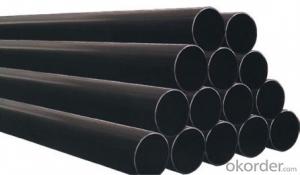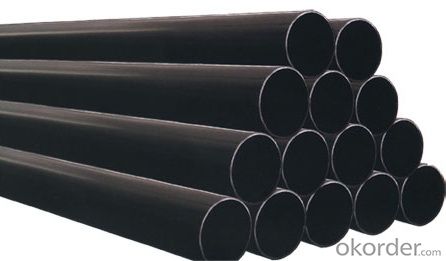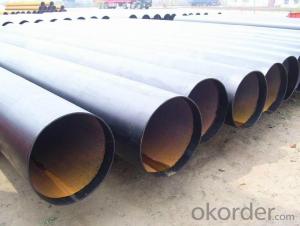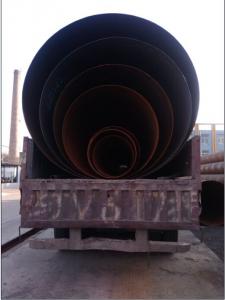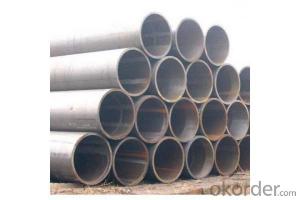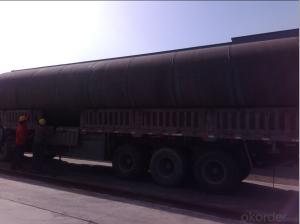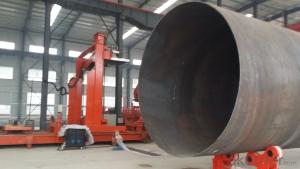26‘' CARBON STEEL SSAW WELDED PIPE API/ASTM/JIS/DIN
- Loading Port:
- Tianjin
- Payment Terms:
- TT OR LC
- Min Order Qty:
- 5 m.t
- Supply Capability:
- 300 m.t/month
OKorder Service Pledge
OKorder Financial Service
You Might Also Like
Packaging & Delivery
Packaging Detail: | standard export packing or as customer's requirement |
Delivery Detail: | within 10 - 30 days |
Specifications
Spiral Welded Steel Pipes and Tubes
1.Material:Q195-Q235
2.Length:1-12m
3.WT:1.0-14mm
4.O.D.:20-273mm
Product Description:
1.Material : Q235,Q345,L245,L290,L360,L415,L450,L485,GrB,X42,46,X52,X56,X60,X65,X70,X80,X100
2,Standard: SY/T5037-2000,GB/T9711-2011,API Spec 5L PSL1/PSL2,ASTM A252\A53,ISO3183,DIN17172,EN10217,JIS G3457,AWWA C200,ASTM A139,ASTM A671,ASTM A672
3.Wall thickness: 3.0mm-30mm
4.Outer diameter: φ168mm-3020mm
5,Length: 5m-12m or as your requirement
6,Corrosion protection standard: DIN30670,DIN30671, AWWAC210, AWWA C203, SY/T0413-2002,SY/T0414-2002
7,Application: Oil, gas, natural gas, water pipe, thermal electricity pipe, steel structure engineering, etc
Q195-q345 Material Steel Pipe's Materials
Elements | Chemical Compsition% | Mechanical Property | ||||||
C% | Mn% | S% | P% | Si% | Yield Point (Mpa) | Tensile Strength(Mpa) | Elongation | |
Q195 | 0.06-0.12 | 0.25-0.50 | <0.050< span=""> | <0.045< span=""> | <0.030< span=""> | >195 | 315-430 | 32-33 |
Q215 | 0.09-0.15 | 0.25-0.55 | <0.05< span=""> | <0.045< span=""> | <0.030< span=""> | >215 | 335-450 | 26-31 |
Q235 | 0.12-0.20 | 0.30-0.70 | <0.045< span=""> | <0.045< span=""> | <0.030< span=""> | >235 | 375-500 | 24-26 |
Q345 | <0.20< span=""> | 1.0-1.6 | <0.040< span=""> | <0.040< span=""> | <0.55< span=""> | >345 | 470-630 | 21-22 |
Packaging & Delivery
Packaging Detail: | Normal exporting packing,in container or bulk vessel or as per clients' request |
Delivery Detail: | 2 months after confimed contract |
Specifications
Large Diameter API 5L X70 PSL2 LSAW Steel Pipe
Grade: X42, X46, X50, X52, X60, B, C
OD: 1.5"-28"
WT: SCH10-SCH160
Brand:TPCO
Large Diameter API 5L X70 PSL2 LSAW Steel Pipe
Specifications:
u Standard: API 5L
u Grade: B, C, X42, X46, X50, X52, X56, X60, X65, X70, X80
u OD: 1.5"-28"
u WT: SCH10-SCH160
u Length: 5-12m
u Ends Finish: plain end, bevel end, grooved end
u Surface Treatment: bare, black varnished, oiled finish, red color, anti-corrosion, 3PE, FBE or epoxy coating
u Technique: hot rolled or cold drawn
u Application: api 5l steel pipe for conveying oil, water, gas
u Invoicing: based on theoretical weight or actual weight
u Payment Terms: L/C at sight, T/T or Western Union
u Trade Terms: FOB, CFR, CIF
u Certification: ABS manufacturing assessment, ABS design assessment, API 5CT, API 5L, DNV manufacturer certificate, ISO9001 quality management system certificate, ISO14001 environment management system certificate, GB/T28001 occupational health and safety management system certificate, A1 class manufacturing license of special equipment certificate, CCS, GL, LR, SGS, TüV, PDE
- Q: What are the factors to consider when selecting steel pipes for a project?
- When selecting steel pipes for a project, several factors need to be considered. These include the intended use of the pipes, the type and grade of steel required, the dimensions and specifications needed, the environmental conditions the pipes will be exposed to, and the budgetary constraints of the project. Additionally, factors such as corrosion resistance, strength, durability, and ease of installation should also be taken into account. Overall, careful consideration of these factors ensures that the selected steel pipes are suitable for the specific project requirements.
- Q: What are the different end types for steel pipes?
- There are several different end types for steel pipes, including plain ends, beveled ends, threaded ends, and grooved ends. Plain ends are smooth and do not have any special features. Beveled ends are cut at an angle to facilitate welding. Threaded ends have threads that allow for easy installation with other fittings. Grooved ends have grooves that enable quick and secure connections using couplings.
- Q: What is the role of steel pipes in the aerospace industry?
- Steel pipes play a crucial role in the aerospace industry as they are widely used for various applications such as fuel and hydraulic systems, air conditioning, and structural support. These pipes provide strength, durability, and resistance to high pressures and extreme temperatures, ensuring the safe and efficient operation of aircraft.
- Q: Can steel pipes be used for underground sewage systems?
- Yes, steel pipes can be used for underground sewage systems. Steel pipes are known for their durability and strength, making them suitable for underground applications. However, it is essential to ensure that the steel pipes are properly coated or protected against corrosion to prevent damage from sewage and soil conditions.
- Q: How do you calculate the pressure drop in a steel pipe?
- To calculate the pressure drop in a steel pipe, you need to consider several factors such as the diameter and length of the pipe, the flow rate of the fluid, and the properties of the fluid itself. One commonly used equation to calculate the pressure drop in a pipe is the Darcy-Weisbach equation, which is given as: ΔP = (f * (L / D) * (ρ * V^2)) / (2 * D) Where: ΔP is the pressure drop in the pipe f is the Darcy friction factor, which depends on the pipe roughness and Reynolds number L is the length of the pipe D is the diameter of the pipe ρ is the density of the fluid V is the velocity of the fluid To calculate the Darcy friction factor, you can use different methods depending on the flow regime. For laminar flow, you can use the formula f = 16 / Re, where Re is the Reynolds number. For turbulent flow, there are several methods to determine the friction factor, such as the Colebrook equation or the Moody chart. It is important to note that the properties of the fluid, such as its viscosity and density, may vary with temperature and pressure. Therefore, it is necessary to consider these variations when calculating the pressure drop. Additionally, it is worth mentioning that there are other factors that can affect the pressure drop in a steel pipe, such as fittings, valves, and elbows. These factors introduce additional losses, which can be accounted for by using appropriate correction factors or by directly measuring the pressure drop across these components. Overall, calculating the pressure drop in a steel pipe involves using the appropriate equations, considering the properties of the fluid, and accounting for the various factors that may affect the flow. It is recommended to consult relevant engineering handbooks or utilize specialized software for accurate calculations.
- Q: How are steel pipes used in the manufacturing of structural frameworks?
- Steel pipes are commonly used in the manufacturing of structural frameworks due to their strength, durability, and versatility. These pipes are used as components in the construction of frameworks, such as buildings, bridges, and towers, providing support and stability to the overall structure. Steel pipes are often used to create columns, beams, and trusses, which are essential for bearing heavy loads and ensuring the structural integrity of the framework. Additionally, steel pipes can be easily welded, allowing for efficient and cost-effective construction processes. Overall, steel pipes play a crucial role in the manufacturing of structural frameworks by providing a robust and reliable solution for various construction projects.
- Q: Can steel pipes be coated for aesthetic purposes?
- Yes, steel pipes can be coated for aesthetic purposes. Coatings such as paint, powder coating, or galvanizing can be applied to steel pipes to enhance their visual appearance and protect them from corrosion. These coatings can provide a variety of colors and finishes to suit different aesthetic requirements.
- Q: How are steel pipes used in agriculture?
- Various purposes in agriculture make steel pipes widely used, with one common application being irrigation systems. These pipes, known for their durability and ability to withstand water pressure, transport water from wells or reservoirs to different areas of farms, enabling efficient water distribution over long distances. Furthermore, steel pipes find utility in agricultural drainage systems. By removing excess water from fields, they prevent waterlogging and ensure proper drainage. Their resistance to corrosion is particularly significant in agricultural settings, where exposure to moisture and various chemicals is common. Moreover, steel pipes serve a vital purpose in the construction of greenhouse structures. They provide structural support for the greenhouse framework and facilitate the installation of irrigation systems and other equipment. The strength and sturdiness of steel pipes enable them to withstand harsh weather conditions, making them an ideal choice for greenhouse construction. Additionally, livestock farming benefits from the use of steel pipes. They are frequently employed in the creation of fences and enclosures for animals, providing a secure and long-lasting barrier. Steel pipes also play a crucial role in the construction of animal shelters and barns. To summarize, steel pipes play a crucial and versatile role in agriculture. They are integral components in irrigation systems, drainage systems, greenhouse construction, and livestock farming. Thanks to their durability, strength, and resistance to corrosion, steel pipes are an excellent choice for a wide range of agricultural applications.
- Q: What is the difference between steel pipes and cast iron soil pipes?
- Steel pipes and cast iron soil pipes are both used for plumbing and drainage systems, but they differ mainly in their material composition and durability. Steel pipes are typically made from an alloy of iron and carbon, which provides them with high strength and resistance to corrosion. On the other hand, cast iron soil pipes are made solely from iron, making them more susceptible to rust and corrosion over time. Additionally, steel pipes are generally lighter, easier to handle, and more flexible than cast iron soil pipes. However, cast iron soil pipes are known for their superior soundproofing properties, making them a preferred choice in buildings where noise reduction is crucial.
- Q: What is the fire rating of steel pipes?
- Several factors determine the fire rating of steel pipes. Steel possesses inherent fire resistance due to its high melting point and low thermal conductivity. However, the fire rating of steel pipes can be further improved by employing fire-resistant coatings or insulation materials. These additional measures can offer different levels of fire protection, typically quantified by how long the pipes can retain their structural integrity during a fire situation. The precise fire rating of steel pipes may differ depending on the thickness and type of coating or insulation employed. To ascertain the appropriate fire rating requirements for specific applications, it is crucial to refer to industry standards, such as those established by organizations like the National Fire Protection Association (NFPA), or consult with fire safety professionals.
Send your message to us
26‘' CARBON STEEL SSAW WELDED PIPE API/ASTM/JIS/DIN
- Loading Port:
- Tianjin
- Payment Terms:
- TT OR LC
- Min Order Qty:
- 5 m.t
- Supply Capability:
- 300 m.t/month
OKorder Service Pledge
OKorder Financial Service
Similar products
Hot products
Hot Searches
Related keywords
